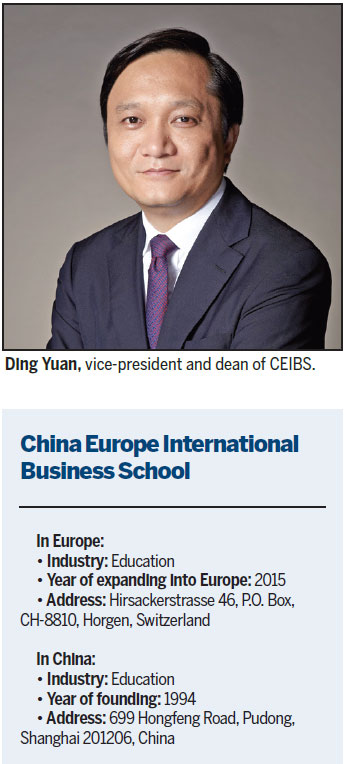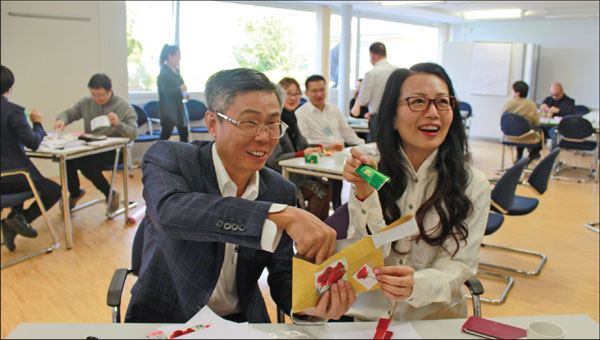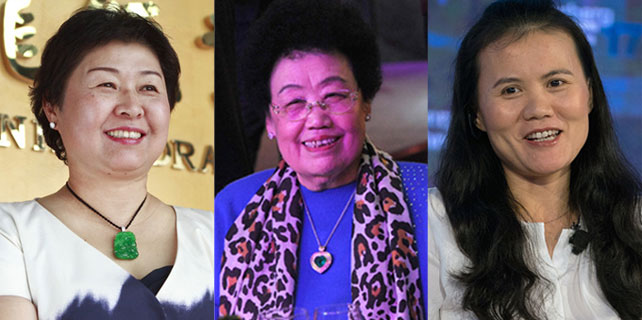In the business of learning
Expanding school adapts its syllabus to meet changing international demands
In the peaceful Swiss village of Ibach, a group of Chinese businessmen are deeply immersed in their conversation with Carl Elsener Jr, the fourth-generation owner of the world famous Swiss army knife maker Victorinox, trying to understand how this century-old company has turned a relatively simple pocket-knife into the global phenomenon.
This is the scene of a typical lesson in Switzerland provided by the China Europe International Business School, a Shanghai-based Chinese business school that has been increasingly internationalizing its syllabus and company case study visits in recent years. Other brands to which CEIBS frequently takes its students on study tours include luxury names such as Ferragamo, Caruso Menswear, Jung von Matt and Gubelin.
|
CEIBS students on a study tour at its Zurich campus. Photos Provided to China Daily |
"Our Zurich campus is critical to our mission of connecting China and Europe, so we can help Chinese businesses to develop their globalization strategies and help multinationals to gain insights on operating in China," says Ding Yuan, vice-president and dean of CEIBS.
In Europe, CEIBS' expansion journey reached a milestone in 2015, when it launched a campus in Horgen, on the shore of Lake Zurich. This campus became the base for CEIBS to offer its Europe-related study modules for its Executive MBA students.
Established under an agreement between the Chinese government and the European Commission in Shanghai in November 1994, CEIBS was the first business school on the Chinese mainland to offer a full-time MBA, an Executive MBA and a wide range of executive education programs. All three programs are currently ranked in the world's Top 30 by the Financial Times.
By the end of December 2017, CEIBS alumni numbers had reached more than 20,000, by which time the school had also provided management training for over 130,000 executives.
In 2009, the school established a campus in Accra, Ghana, that offers programs that help Chinese and African executives understand more about doing business in each other's countries.
In Zurich, the CEIBS campus previously belonged to the Lorange Institute of Business, established in 2009 by Peter Lorange, who had been the president of the Lausanne-based business school IMD for 15 years before setting up his own school.
When Lorange, then 71 years old, decided to retire in 2015, he sold his business school property to a CEIBS alumnus for 16.5 million Swiss francs ($17.7 million; 14.2 million euros; £12.5 million), and the alumnus then rented the facilities back to CEIBS to use.

CEIBS' European expansion coincides with a wave of Chinese business schools expanding overseas in recent years. In 2017, Peking University's HSBC Business School launched a new campus in Oxford, in the UK, to attract international business school students wishing to learn more about China's business environment. Meanwhile, the Chinese business school CKGSB has established offices in New York, Hong Kong and London.
Chinese business schools such as CEIBS and CKGSB are competing to climb international league tables in a fiercely competitive market against incumbents such as Harvard, Stanford and London Business School.
George Iliev, accreditation director for China at the London-based Association of MBAs, says two of CEIBS' unique advantages are its administrative flexibility and the growing economic strength of China. CEIBS' administrative flexibility, due to the fact that it is neither funded directly by the government nor affiliated with a university, means it is able to pay competitive salaries to professors.
"This flexibility also allows CEIBS to reinvest its surplus into continuous improvement, unlike university-affiliated business schools, some of which see their surpluses reinvested in other departments of the university," says Iliev.
"Already CEIBS is more international in terms of campus locations, compared to some globally leading business schools that only have a campus in one country. The fact that students do not yet immediately think of going to China for business school has prompted CEIBS to expand overseas, to reach international students and companies," Iliev says.
Ding says the acquisition of the Lorange Institute of Business was an effective way for CEIBS to establish its reputation in the European market because, with the local team's help, the school immediately established a friendly relationship with Swiss businesses and executives.
"We were welcomed into Switzerland's business community. We were able to take our students to visit Swiss businesses, and our professors were welcomed by these businesses to write case studies about them, and from there we expanded our footprint in other European countries," says Ding.
Over the past two years, CEIBS has offered its Chinese EMBA students eight trips to its Zurich campus, which the school will increase this year. So far, the demand for the Zurich trips has far outstripped supply, especially considering that CEIBS' Chinese EMBA classes comprise around 700 students each year.
In Zurich, the Chinese students will study modules such as branding, how to run a family business, how to provide excellent service and how to move up the value chain. These are all lessons that Switzerland has an advantage in, considering it is famous for its hospitality industry, high-end manufacturing, branding and family businesses.
CEIBS also uses its Zurich campus for its Global EMBA classes, which put students from all over the world into the same class to maximize interaction. The classes are taught across four continents and the program targets executives working in a global environment.
CEIBS' classes have so far received favorable feedback from students and course participants.

Ergai Ta, founder and CEO of Orange Dental, a China-based chain of pediatric dental clinics, participated in the CEIBS smart healthcare study tour to Switzerland, and says he learned great lessons about innovation during the trip. In particular, during a visit to the pharmaceutical company Roche, he took away knowledge of how to run a giant company while remaining humble.
Alex Roberts, a senior mergers and acquisitions lawyer at global law firm Linklaters in Shanghai, says that studying at CEIBS has helped him to further integrate into the local community in Shanghai. Not only was he able to mix with classmates on the same CEIBS program, who quickly became friends, he also frequently attended alumni events in Shanghai, which enabled him to make new friends and contacts to expand his social and business networks.
Roberts, originally from England, moved to Shanghai six years ago. He completed the Global EMBA program at CEIBS between 2015 and 2017. He greatly appreciated the opportunity to interact with Chinese classmates. "It helped me to understand the Chinese students' way of thinking, which is useful for me when I interact with Chinese clients now," he says.
Reflecting on CEIBS' expansion over the years, Ding says the school has encountered several stages of growth, strongly aligned with the footsteps of China's international integration and Chinese companies' trends of globalization.
"For the first 10 to 20 years of our operation, our main mission was to satisfy the training needs in China to develop business executives with international standards," Ding says.
In more recent years, CEIBS' mission changed, partly due to increased competition from other business schools and partly due to the changing needs of students.
"Other businesses schools were doing the same and we could have lost our competitive edge if we had stayed with the previous model. So we decided to offer suitable courses that help Chinese companies experiencing rapid changes."
Such changes were varied. Some Chinese companies were becoming more sophisticated and international. But even those that stayed focused on China's domestic market were facing new challenges, such as the need for innovation, wealth management, family business succession and brand building. Consequently, CEIBS' latest syllabus and international modules are designed with a focus on helping Chinese companies overcome such challenges.
Despite CEIBS' growth, it still lags behind the world's most famous business schools. Ding acknowledges this gap, adding that his vision is for CEIBS to become the "Chinese Harvard".
"We want to become the best in what we do, which is providing knowledge and training that relates to China's context and situations. We have already built up our competitive edge in this respect, and we're well on our way to enhancing our reputation in the future," Ding says.
cecily.liu@mail.chinadailyuk.com
(China Daily European Weekly 02/02/2018 page30)



















